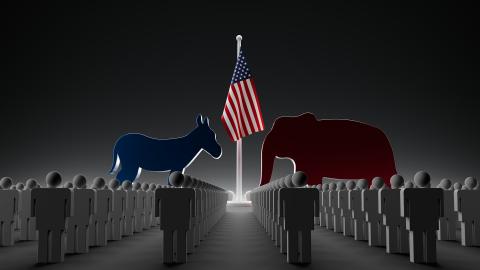Photo Credit: Jigar Panchal / Unsplash+
Is the Green Party a “false flag” campaign operation by Republicans?
Like they’re practicing on us for playing sides off each other in Syria, Yemen, Nicaragua, and Iran when they take on power in Washington?
While the nations practice war and space faring so they’ll be ready in time to join the interstellar alliance against some really bad aliens in some millennia?
All sounds conspiratorial, right?
Well, it is.
Operatives working for either side find that it may be most effective when the votes are counted, to peel off some of their voters’ opposition from turning out for them on Election Day.
Meanwhile, each party also plays defense in this game of cat and mouse, working to deny ballot access to third parties in districts where they are competing for votes.
The way Ross Perot and his Reform Party message split off enough votes from George Bush in 1992 that his campaign may have tipped the scales in Bill Clinton’s favor.
This way the two-party system may be helping third parties to radicalize voters against the vantages of more mainstream coalitions to get them to defect to a third party on the ballot.
While working to activate, energize, and turnout their voters on Election Day, Democrats and Republicans are playing wedges with the pie chart, but the Dems are crying foul.
Republicans And Democrats Love/Hate Relationship With Third Parties
Major parties act against minor parties because of the spoiler effect, until they want to use that same spoiler effect to their advantage.
Here, for example, is a quote from a recent report in Forbes:
“‘The path to victory here is clearly maximizing the reach of these left-wing alternatives,’ former Trump advisor Steve Bannon told The Times in April, before he was sentenced to prison for contempt of Congress. ‘The more exposure these guys get, the better it is for us.’”
By left-wing alternatives, he’s referring to candidates like Dr. Jill Stein. She’s this year’s nominee again for the Green Party.
The progressive third party lost a court bid on Friday to stay on the ballot in the key swing state of Nevada after filing voter signatures on the wrong form.
According to LawDork, a former Trump attorney is helping the Green Party in the Nevada case.
Or take this report from Salon on Monday that says Jill Stein paid $100,000 to a Republican consulting firm led by a suspected January 6 rioter.
It appears the Republican side may be keen on helping a party that may be in direct competition with Democrats for votes.
Of course, a party that is might naturally find the services of a Republican-affiliated company to be more helpful toward achieving its goals.
Meanwhile, Republicans are also stoking/competing with Libertarians.
Donald Trump himself and RFK Jr., who Republicans seem to like more than Democrats, both spoke to Libertarians at their party convention this year.
The DNC worked hard to get RFK off the ballot in multiple states, but now Democrats are fighting to keep him on the ballot in states like North Carolina.
Trump tried to woo Libertarians, and yet Iowa Republicans made sure to kick all Libertarian congressional candidates off the ballot.
AOC Calls Out Stein For Playing Politics
"All you do is show up once every four years to speak to people who are justifiably pissed off, but you're just showing up once every four years to do that, you're not serious," AOC said. “To me it does not read as authentic. It reads as predatory.”
But isn't that the perception that independent voters have of most politicians in the two main parties? That they give lip service to the electorate every four years, but then carry on business as usual between elections?
If Jill Stein is a predator, she isn't a very good one. She's not as good at it as the two-party system's brightest stars. They bring millions of people together with campaign rhetoric that the reality of their administrations does not always reflect.
Like Bush, Sr. who said, "Read my lips, no new taxes," then raised taxes?
Or Obama, who said "Change," and then faithfully carried on pretty much the entirety of George W. Bush's domestic and foreign policy?
But what third party candidates do offer voters is a chance to register a tally of no confidence in the two major parties over time, keeping them more honest.
If they ever really go too far off the rails, the third-party people have been practicing for that moment to step in, like Trump did, and really do something about the establishment's grip on politics.
